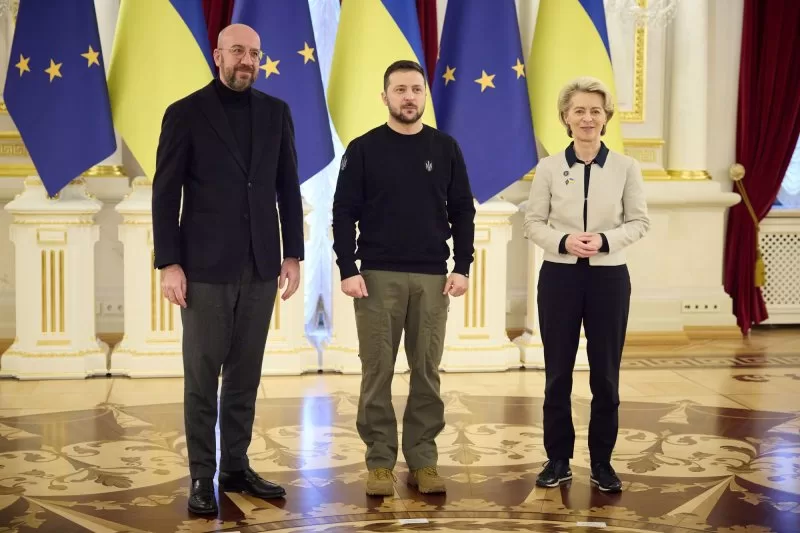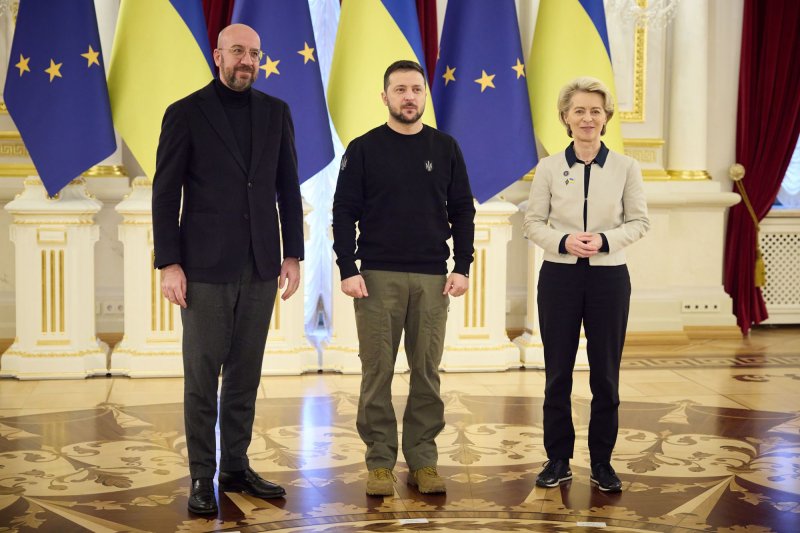Ukrainian President Volodymyr Zelenskyi (C), European Commission Ursula von der Leyen (R) and President of the European Council Charles Michel pose for a photo in February of 2023. On Monday, the European Union agreed to provide Ukraine with more than $5 billion in additional funding for its war against Russia. File Photo by Ukrainian President Press Office/UPI |
License PhotoMarch 19 (UPI) — Foreign ministers of the European Union have allocated more than $5 billion for Ukraine‘s military as additional funding from Kyiv’s largest backer, the United States, remains stalled by Republicans in Congress.
The European Council, which defines the overall political direction of the 27-member bloc, agreed Monday to increase funding for Ukraine by $5.4 billion through the creation of the Ukraine Assistance Fund.
The UAF was established under the European Peace Facility, a military and assistance funding mechanism created by the union in March 2021 with a budget of some $13 billion to run through 2027. Its mission is to prevent conflicts and strengthen defense.
Since Russia invaded Ukraine on Feb. 24, 2022, the EU member states have given Ukraine around $30 billion in military support, including some $6.6 billion through the EPF.
“The Ukraine Assistance Fund turns our words into action,” Josep Borrell, the EU’s top diplomat, said in a statement Monday. “With the fund, we will continue to support Ukraine defend itself from Russia’s war of aggression with whatever it takes and for as long as we need to.”
President Volodymyr Zelensky of Ukraine thanked the European lawmakers for the move in his nightly address Monday, stating they expect “this fund to become part of a general security agreement” between Ukraine and the union.
The funding comes as Ukraine’s military is running low on supplies, particularly artillery and ammunition.
The United States has sent more than $44 billion in security assistance to Ukraine, and President Joe Biden has for months sought to pass legislation that includes an additional $60 billion for the besieged ally.
But the bill has been met with staunch opposition from far-right Republicans in Congress who have sought to leverage the issue to secure funding and stricter policies for the U.S. southern border.
Last month, the Senate passed a bill that includes funding for Ukraine, Taiwan and Israel, but the Republican-led House has yet to bring it to the floor. If the bill does come up for a vote, it is expected to face stiff opposition from allies of former President Donald Trump who is against sending money to Ukraine and has floated the idea of giving Kyiv aid in the form of a loan.
On Monday, Sen. Lindsey Graham of South Carolina — who voted against the bill last month — was in Ukraine for talks with Zelensky about U.S. support.
Graham said he promoted Trump’s loan plan as “the most likely path forward.”
“It is clear Ukrainians appreciate the United States’ support,” Graham said on X. “I know Americans want to help our friends and allies, but I also believe we must consider our economic situation as we help others.”
According to a readout of the discussion from Zelensky’s office, the European leader emphasized that support from the United States is now more important than ever and that Kyiv is counting on it.
“We count on preserving and strengthening such support,” he said.
Last week as the security bill languished in Congress, the Biden administration unveiled a $300 million security package for Ukraine. Though Congressionally approved funds have all been tapped, the money was made available through cost-saving measures, officials said.

